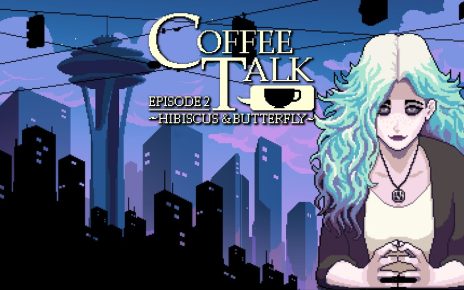What is music and what gives it meaning? What role will it play in our lives? For some, it might be a way to speak important truths, while for others it’s a chance to build one’s own world. All of us seek our own answer, and for many these questions will always remain open. Musicus!, the final visual novel from studio Overdrive, aims to explore these ideas through an ambitious coming of age story. The result is at once messy, thoughtful, overwrought, and in its brightest moments, an undeniable force.
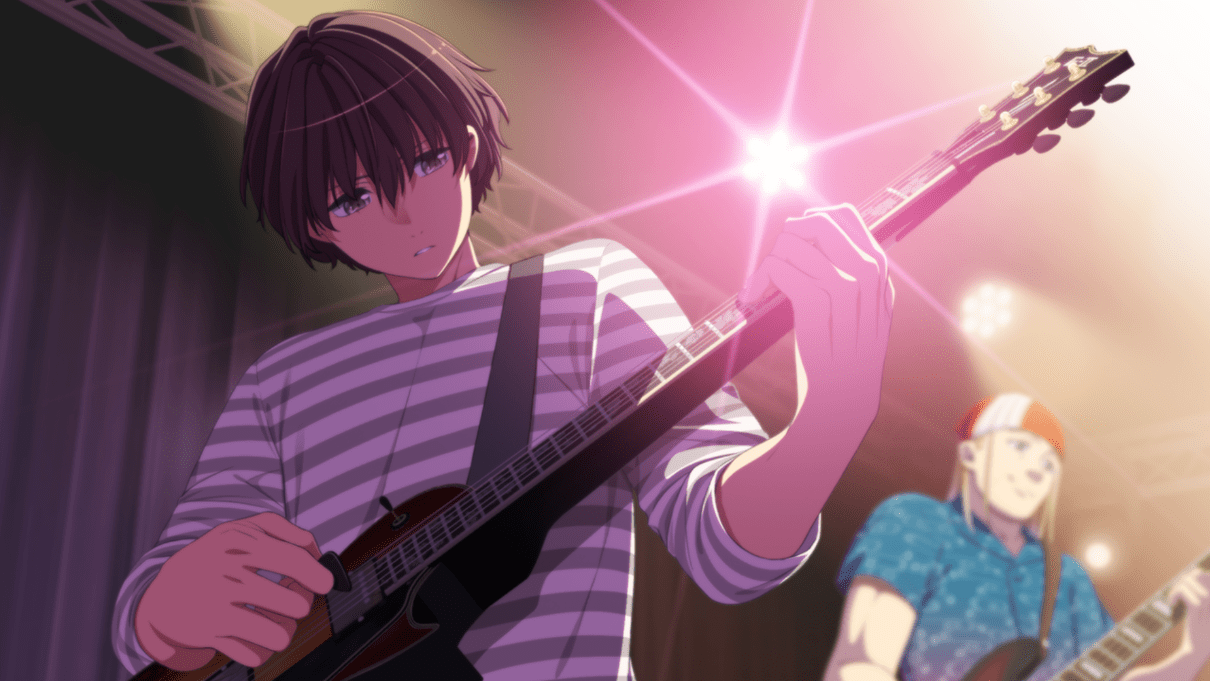
Carry on Wayward Son
Musicus! tells the story of part-time student Tsushima Kei. Kei comes from money and can seemingly excel at whatever he puts his mind to. Despite his outwardly cushy life, Kei is somewhat aimless when we first meet him. It’s initially tempting to write him off as another generic protagonist passively drifting through high school. However, he has his share of troubles, some the results of his own decisions and others from his circumstances. Furthermore, Kei’s uncertainties don’t stem from apathy or laziness but rather from an earnest desire to understand how to find meaning in his life. Little does he know a chance encounter with rock is about to turn things upside down.
Kei is consistently thoughtful and empathetic toward those around him. Many of the students in his part-time class unsurprisingly have challenges most high school students don’t. Likewise, most of the musicians he encounters have very different lives than he does. Still, Kei makes a real effort to understand these people and treat them with respect. Kei has his flaws of course. He can be self-righteous and insensitive and at times looks down on others. But he’s also willing to reflect on his mistakes and admit he doesn’t have all the answers. I found Kei a relatable coming-of-age protagonist and his maturity incredibly refreshing against the sea of clueless and apathetic losers that populate so many visual novels.
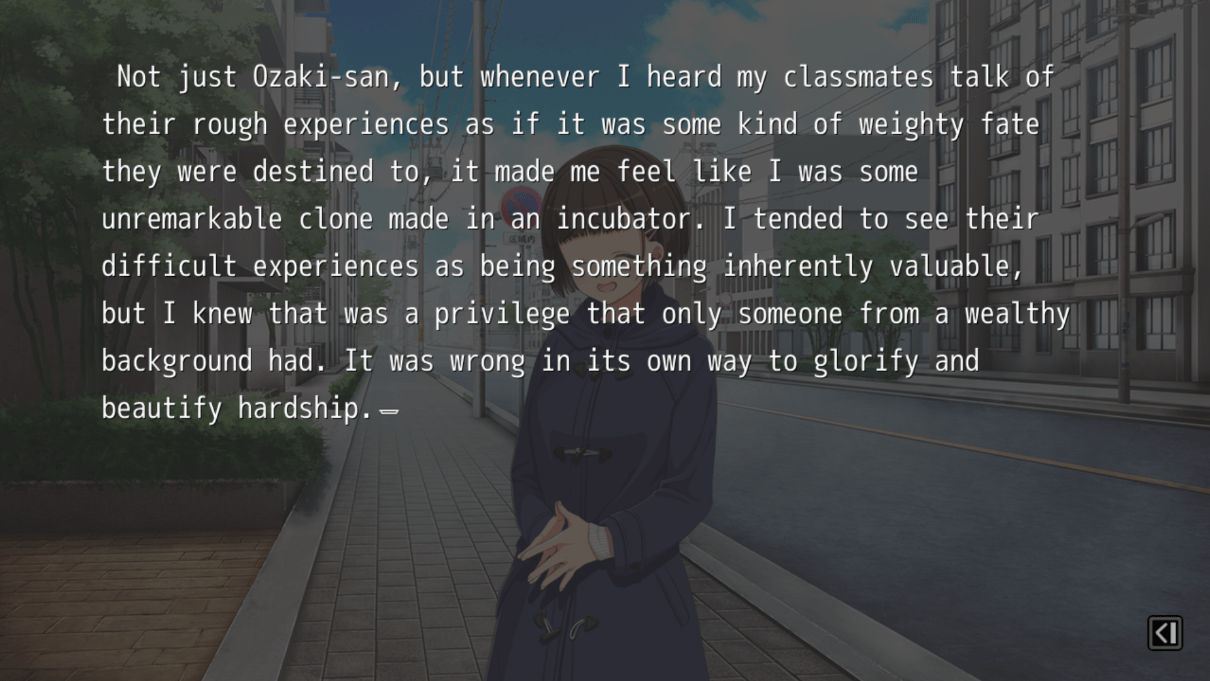
Sometimes Kei ends up paralyzed by his own thoughts though. Musicus! can take itself too seriously, and this mostly manifests in Kei’s highly cerebral inner monologue. It becomes ponderous when he retreads the same idea for the fifth time with no real development in his beliefs. The amount of prose spent expounding Kei’s thoughts can also make him feel like a detached observer. To an extent this is his personality and why rock resonates with him in the first place. But the experience would be more dynamic if this part of him were challenged just a little more often. The moments where Kei shines and grows the most are those where he gives up control or takes a leap of faith rather than those where others readily defer to his organized leadership and dispassionate judgment or those where he watches unmoved from the sidelines.
Welcome to the Jungle
Musicus!’s common route sees Kei swept into the world of professional rock music. After catching the eye of a talent scout, he’s asked to write about a show by respected indie band Kacho-Fugetsu. Once Kei gets that first intoxicating hit of raw rock blasted in a dingy club to an audience of true believers, he asks himself: Is this that thing I’ve been looking for that can set my heart on fire? At the same time, he gets a close-up view of the musician’s life, one vastly different from his own. Is this really something he wants to do? His family’s wealth means he is well-positioned to attend a prestigious college if he focuses on school.
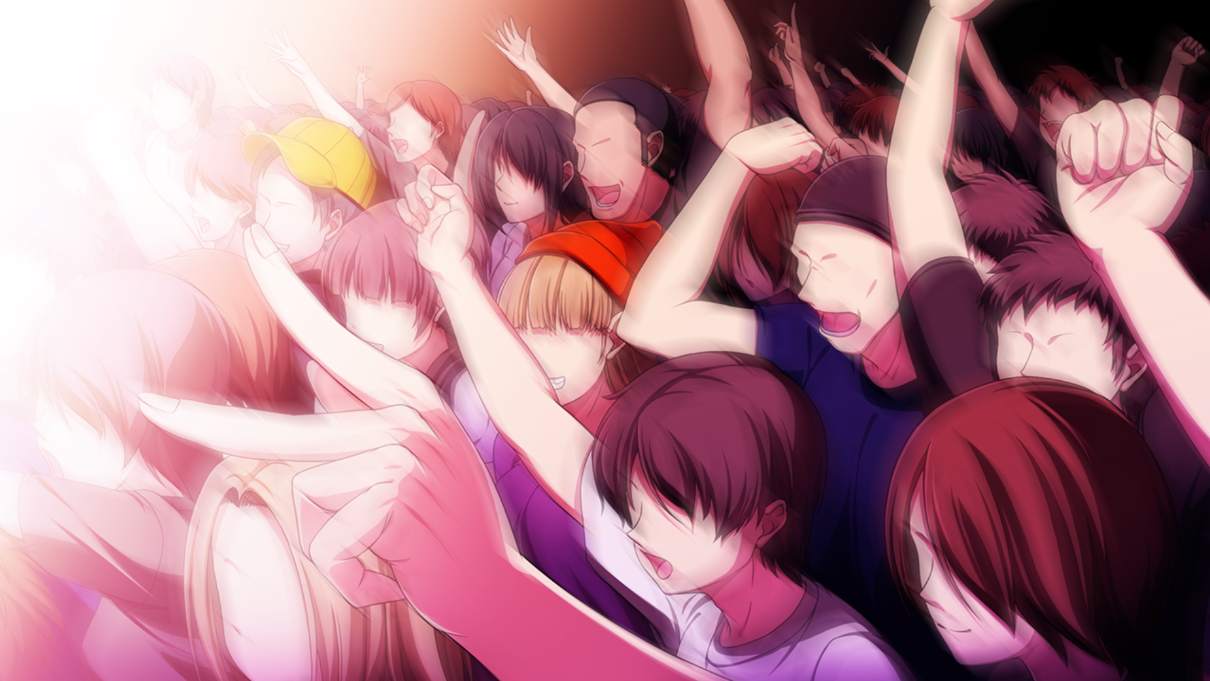
I wondered going in if Musicus! would focus mainly on the glamorous aspects of music. In fact, Musicus! is surprisingly thoughtful and realistic in this regard. Life as a musician is more sweaty van rides schlepping amps than five-star hotels and groupies. Developing skill takes long hours of intensive practice. Even though Kei has exceptional talent, he’s not headlining the Tokyo Dome after 6 months because of some vague intangibles. To walk the musician’s path also means to open yourself, both to financial failure and to the possibility that the feelings and ideas that drive you will fail to reach your audience, or worse, consume you from the inside. Musicus! forces Kei to confront these realities as he ponders what role music should play in his life.
Stairway to Heaven
Musicus! has 3 routes arranged in a ladder structure – one where you can go along the main route to its conclusion or exit early and head off in another direction. There’s also a fourth “hidden” route that’s significantly darker. While most of our readers will want to play these in English, Japanese is also an included option.
Each route has a love interest, but romance takes a back seat. Musicus! is primarily about Kei and those around him struggling to make choices and find direction as adults entering the world and the role music plays in this journey. The stories are driven by ensemble casts, giving a broad view with side characters often having their own arcs. These characters have vividly realized lives and don’t simply exist to move the plot along. Even Kaneda, the main comic relief, gets substantive development. Doubly impressive is that the supporting cast is very different depending on which route you choose, and even characters who appear only in one part of a single route are thoughtfully crafted.
The central question that each of the routes explores from a different angle is: what gives music (and art generally) meaning and value? The first layer is akin to the Euthyphro dilemma. Can music be inherently good or is this determined by context? Should you create your purest vision or make something widely admired? Can the musical process even control these outcomes? These questions must also be answered in the context of the costs the creator bears. Beyond the challenging lifestyle, some musicians need to bare an essential part of themselves when they create. What if the audience rejects what you feel is your very soul? And unlike a loaf of bread, you can’t eat a song. Whatever meaning and value exists, whether financial or something less tangible, springs from within people: yourself, those important to you, or maybe the commercialized masses. Can you find answers that allow you to live? Is being a musician even worth it?
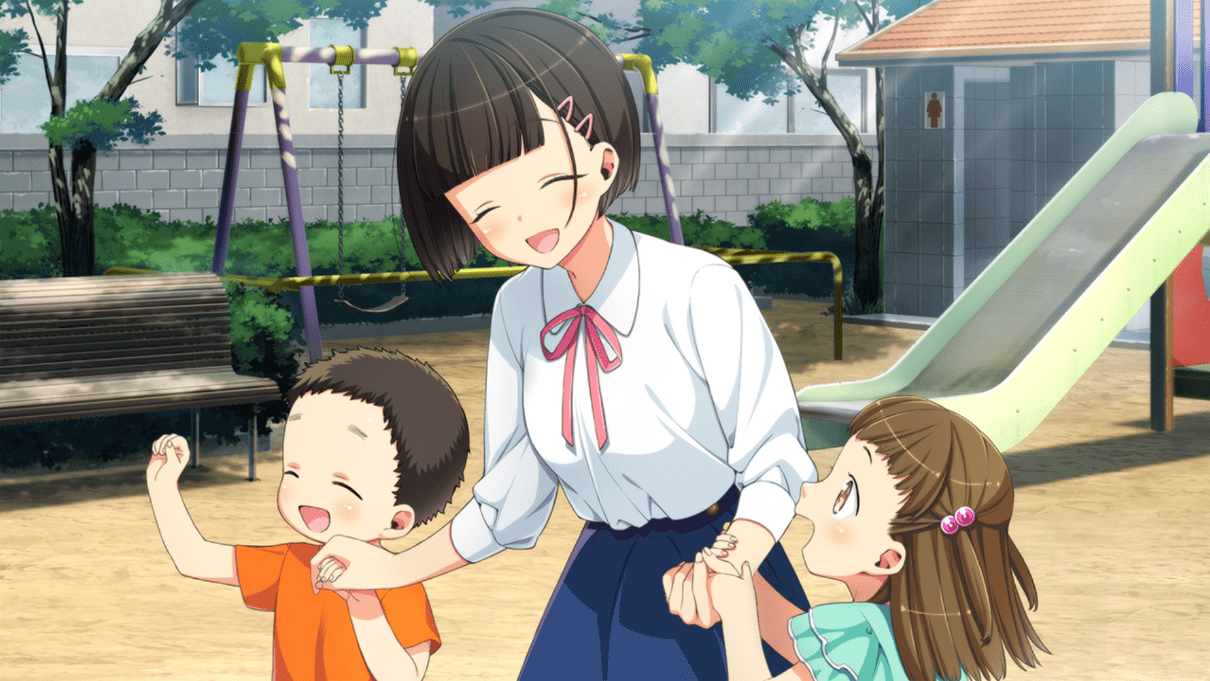
Yako’s route, the first on the ladder, focuses on the part-time high schoolers and Kei’s relationships with them. These students have, for a variety of reasons, deviated from the path that society expected of them. They are keenly aware of their resulting invisibility and frustrated by it. The story explores how this diverse and endearing cast of characters can face the world and find their places on their own terms. Yako, who from her first appearance has an obvious crush on Kei, is a considerate type who struggles to voice and act on her own desires. Kei feels a distance from these students because of his privileged upbringing, but is he really any different? This route probably won’t surprise you, but I found the experience genuine, cozy, and heartwarming.
Next up, Meguru’s route explores the idea of living in the moment and whether this is a worthwhile way to spend one’s limited time in this world. Meguru’s cat-like indifference doesn’t make much impression in the common route, but she comes into her own here. Learning about her formative experiences imbues her terse dialogue with new meaning. Meguru is surprisingly introspective too, and I think she and Kei come to understand and appreciate each other because they are similar in this regard. Perhaps this route is too tidy compared to its central theme, but I still enjoyed it. It doesn’t have the complexity or soaring highs of Mikazuki’s, but it has the best balance of ideas, action, and emotion.

Behind Blue Eyes
Mikazuki’s route is the last stop on the ladder and the main route of Musicus! It’s far longer than the others and features an ambitious exploration of music as a medium to discover and communicate meaning.
The opening sees a flurry of change as Kei and his friends strike out into the world of rock, and this excitement both drives the story forward and plants the seeds of compelling character and relationship arcs. Things then fall into a routine with emphasis on the passage of time. I think this is an intentional choice meant to evoke the daily grind of life as a musician. It does that effectively but at the expense of pushing aside many of said character and relationship arcs for long periods of time. It’s jarring that the story shows months passing without important conflicts and character moments being acknowledged at all. New developments are sometimes hinted at but often abandoned as events march onward.
Slice of life scenes provide snapshots of the cast at various points in time but become repetitive and lack impact. The route is also too long and tries to do too much. Musicus! crams in so many small twists and turns that the larger story loses its shape for long stretches.
The pacing issues are most apparent in the treatment of Mikazuki herself. She’s a striking character and an interesting foil for Kei. Each of the pair has traits the other admires but lacks. I was eager to explore her character more deeply and see how she developed, and I consistently found myself wishing she got more screen time in the middle portion of her route. She has moments scattered throughout, but they feel like a handful of pebbles cast into a rushing river. I think Musicus! could have developed her more evenly across the route without sacrificing its broad view and ensemble cast by cutting back on descriptions of the day-to-day, exploring fewer of Kei’s thoughts, and slowing down time a bit.

Despite the problems, when Musicus! bridges into its last verse, it brings down the house. Mikazuki takes center stage, and the ideas behind her search for meaning flow out with torrential force. Kei must make his move as well, and the emotionally charged scenes where characters are made to confront the things they have been avoiding are almost enough to wash away the memory of the tedium that preceded them. Maybe some of the drama that drives this is over the top, but I didn’t really mind. The ending will probably be divisive. The vibe it creates seemed fitting in the moment, but upon reflection, some of the choices feel unearned. Regardless, the characters finally reach the point where they can live true to themselves even if others don’t understand. To me, this is what the journey is ultimately about.
It’s hard to talk too much about the fourth route, often referred to as the bad end, without spoilers. This route fully embraces the destructive power of artistry, and you should play it when you’re feeling resilient. One of the temptations of music is that no matter what you find, there’s always the allure of something more if you can pay the toll of the muse. What makes this especially terrifying is that Kei is so earnest and relatable early on. Even as his path becomes darker and darker, it never feels totally implausible and it’s hard to pull back from him.

Feel Like Makin’ Love
The version of Musicus! on Steam is equivalent to the original all-ages release which lacks the adult content. There is an 18+ patch to add these scenes to the Steam version for those interested and the MangaGamer version comes with adult content included by default. If you opt to buy it on Steam and skip the patch, you don’t need to worry about cut content or censorship – at least any further than it was originally intended by Overdrive.
If you apply the patch, each heroine gets one or two sex scenes without mosaics. How well these scenes are integrated into the narrative varies from route to route. Yako’s feels tacked on while Mikazuki’s appropriately arrive at big emotional moments. The scenes themselves are mostly standard fare, though I would describe one as borderline non-consensual. It’s also notable that Kei sometimes slips into abstract musings in the middle of the act.
I Can See for Miles
Overdrive pulled out all the stops to support their vision with a wealth of art, sound, and music. The art is detailed and polished and there’s a huge amount of it. Almost every notable location gets its own CG, and even minor side characters who appear only in one route are often given a sprite. The same goes for voice acting. 30 different named characters have voicing, and all the acting is quality. But perhaps the biggest impact comes from the contrast Musicus! is able to draw from all this when it chooses restraint. A single voice, quiet against the empty night sky, is the ideal fuel to ignite the intensity that follows.
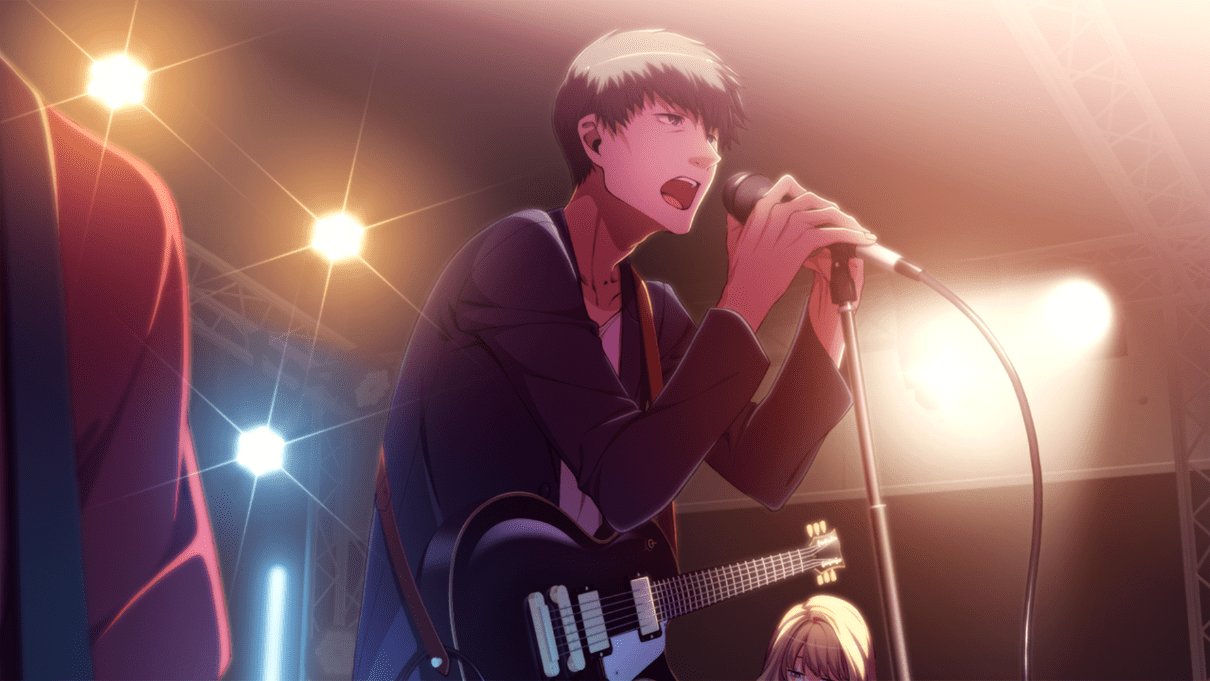
Musicus! also puts great care into building its in-world music scene. The venues and the bands and audiences who inhabit them feel like they could plausibly exist. The most narratively important bands even have original songs you encounter at key moments throughout the story. These songs are fully arranged and performed on rock instruments, and the quality and diversity is impressive. The in-world bands have their own styles too. The driving energy of Pteranodon is distinct from the conflicted angst of Kacho-Fugetsu. You can replay the songs, as well as view translated lyrics, in the extra feature Song Mode.
For presentation, Musicus! uses NVL format rather than the more common ADV format used by most modern visual novels. Text fills the entirety of the screen, and CGs function mainly as highlights between sections of text. As a result, the experience feels more “novel” than “visual”, and the choice comes with tradeoffs. There are no character portraits to identify who’s speaking, and Musicus! is conservative with using visuals to show characters’ expressions changing while they speak. On the other hand, allowing more text on the screen at one time is conducive to expressing complex and nuanced ideas. Given Musicus!’s prose is verbose, NVL is likely the better choice. Still, I occasionally wished I could have spent more time looking at the art.
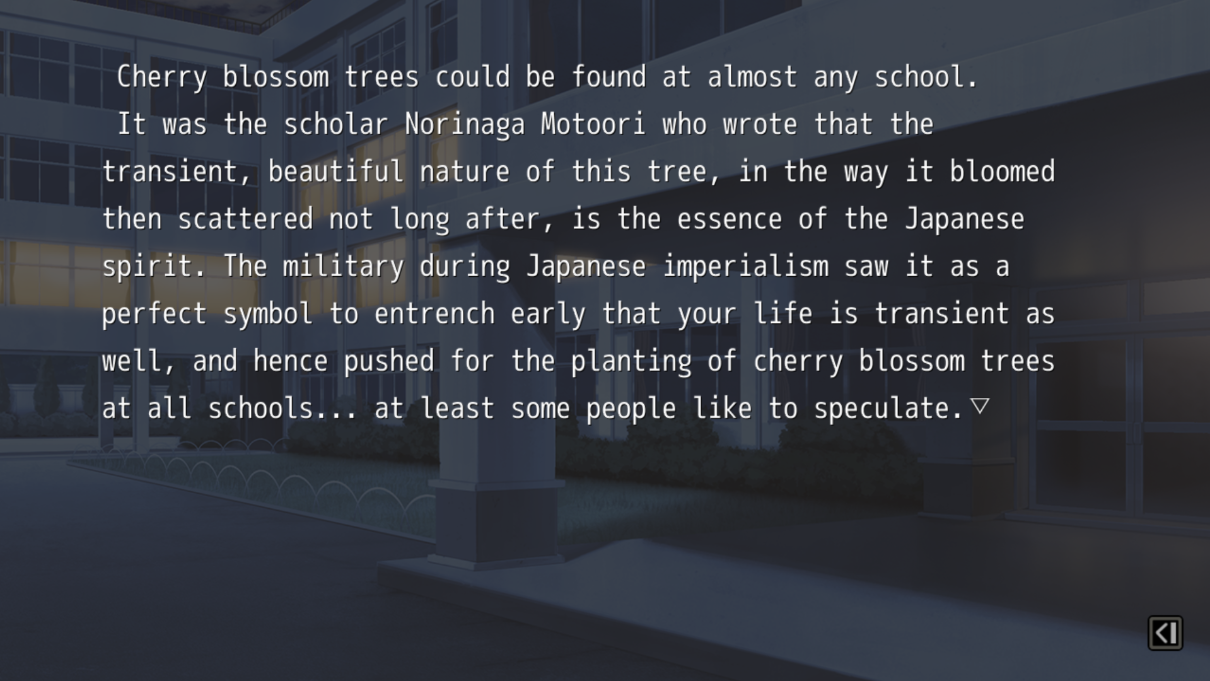
Verdict
Musicus! is an ambitious attempt to explore the meaning of music and its possible roles in our lives through a thoughtful coming of age story set in a vibrant world filled with endearing characters. The execution doesn’t always live up to the ambition though. The pace seriously drags at times, and the drama and ideas can be too heavy-handed. But Musicus! succeeds where it most counts. The big moments are undeniable, and no effort is spared in bringing everything to life in as much detail as possible. Musicus! isn’t a masterpiece, but it’s a worthy sendoff for Overdrive and addition to your catalog.
MUSICUS! IS RECOMMENDED

Purchase Link: MangaGamer
If you enjoy more serious visual novels like this one, you may be interested in Bokuten – Why I Became an Angel.
Many thanks go to the publisher MangaGamer for a PC review code for this title.
A veteran of Oregon Trail and Battletoads, Wes has been playing and talking about games for as long as he can remember. He’s down to try almost anything, and he especially enjoys games with gripping narrative experiences.




